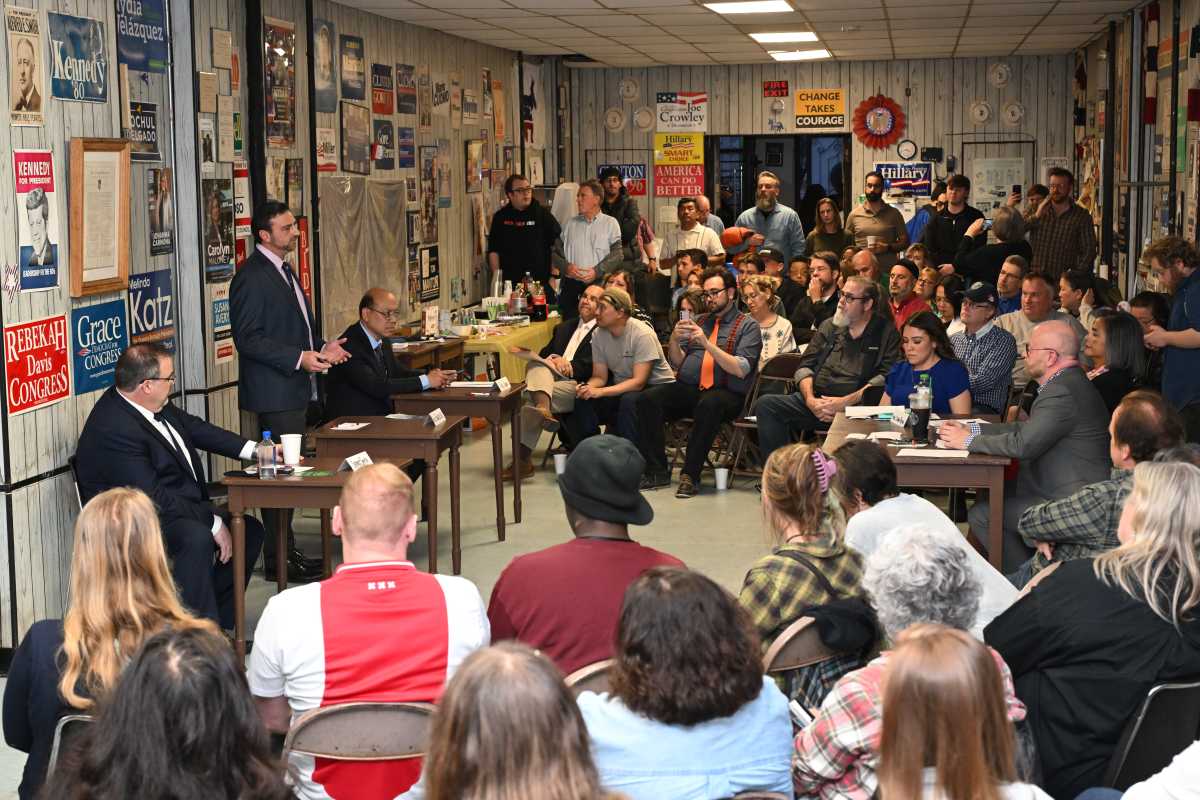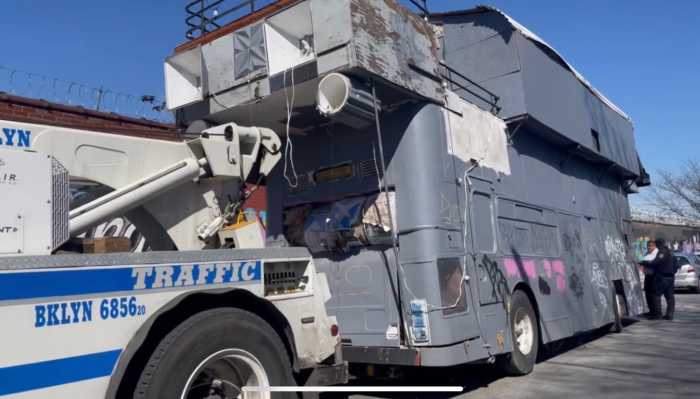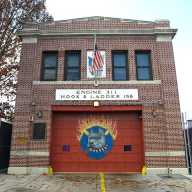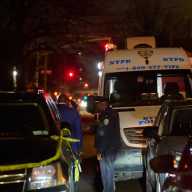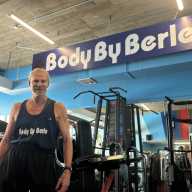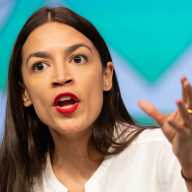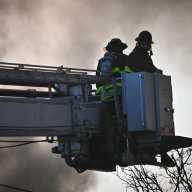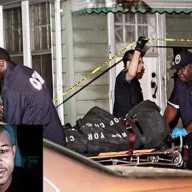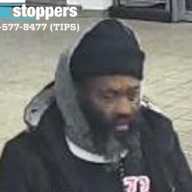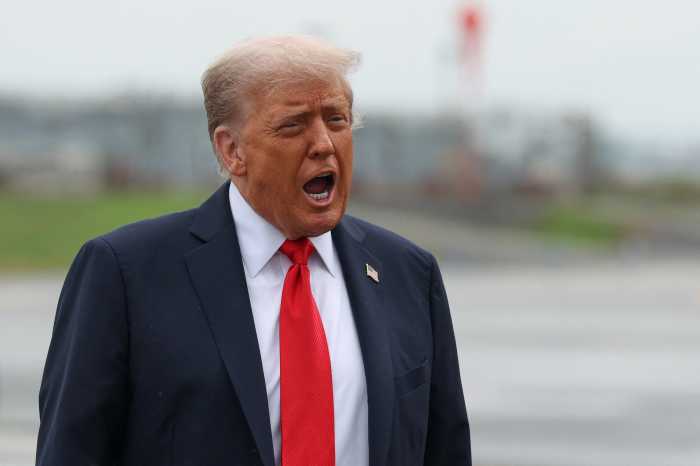The Ridgewood Democratic Club drew a full house on Friday night for a highly anticipated debate featuring the three Democratic candidates vying for the District 30 City Council seat.
Held at the club’s historic headquarters at 60-70 Putnam Ave., the event brought together Paul Pogozelski, Phil Wong, and Dermot Smyth for a spirited and substantive conversation on the key issues affecting residents of Ridgewood, Maspeth, Middle Village, Glendale, Elmhurst and Rego Park.
Starting at 7 p.m., the candidates responded to questions on public safety, transportation, immigration, and civic engagement. The discussion was moderated by Hon. Diana Reyna and Rod Townsend, who guided the debate before a packed room of voters, civic leaders, and community advocates.
The forum was organized in partnership with District Leaders Chhemang Lama, Johanna Carmona, Eddie Lettau and Nijema Rivera-Brow. With the June 24 Democratic primary approaching, the event offered voters a rare opportunity to evaluate the candidates’ platforms, personal backgrounds, and proposed solutions to District 30’s most pressing challenges.
Each candidate began the evening with an opening statement, outlining their personal story and motivations for seeking public office.
Paul Pogozelski, a Middle Village resident, emphasized his local involvement and transition from business owner to community advocate.
“I moved to Middle Village with my family in 2017. I got involved with the community after selling my business in 2022. We started seeing a lot of issues around the neighborhood that needed pressing help and working with local elected officials. We started seeing that if you bound together with your community, you start seeing great things,” Pogozelski said.
He described his experience as a homeschool dad during the pandemic, which deepened his connection to civic life.
“We started with the Middle Village Roller Hockey league. From there, I wandered into the Middle Village Property Owners meetings, and they were about to close the organization. I stepped up and was able to get the organization back active.”
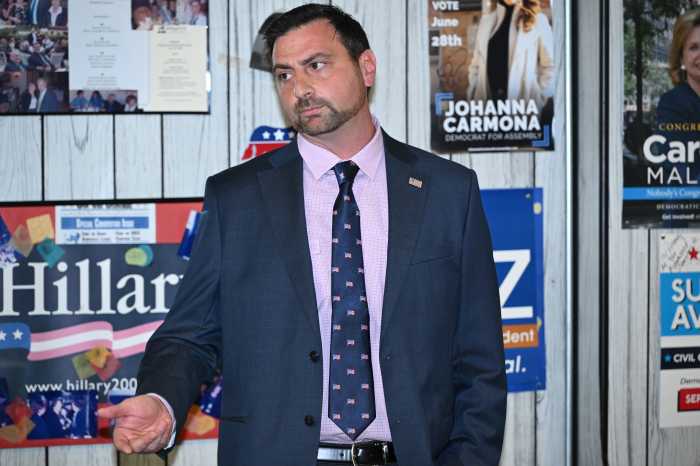
Phil Wong, a longtime Elmhurst resident, spoke about his decades of community involvement and advocacy within the public school system.
“I’ve been a resident of Elmhurst since 1976. I learned my English and my Chinese here. I attended public schools here. I have three daughters and they all have attended public schools here,” Wong said.
His civic engagement took off following a controversial policy decision under Mayor Bill de Blasio.
“In 2014, when de Blasio shut down a hotel and gave it to 650 people overnight, it became a homeless shelter. Now my window faces the PanAm shelter and I get to see them every day… I realized that it’s a business. They’re keeping people in the shelters. They’re not helping them get out of the system.”
That experience led him to join his local community board and later to work for Council Member Robert Holden, who has since endorsed his campaign.
Dermot Smyth, a labor leader, highlighted his professional experience and strong union support.
“I’ve been around this community for 33 years. I’ve worked in the labor movement for 25 years, 16 with the United Federation of Teachers,” he said.
Smyth emphasized the importance of endorsements as a reflection of trust and community alignment.
“Today has been a big day for my campaign. We got several endorsements. The reality is that 100% of the unions that are endorsing in the democratic primary have endorsed my campaign. The union people are your neighbors, moms, dads, sisters, brothers, sons, and daughters.”
One of the most pressing topics was public safety. The 30th Council District spans areas covered by the 104th, 110th, and 112th Precincts. The 104th recently saw its second homicide of the year with the fatal shooting of 19-year-old Kevin Fernandez outside I.S. 77.
Smyth emphasized that quality of life is the top concern in the community and across New York City. He noted that the NYPD is currently understaffed and pledged, if elected, to use his experience and leadership position in the City Council to help increase police staffing and address issues like gun violence.
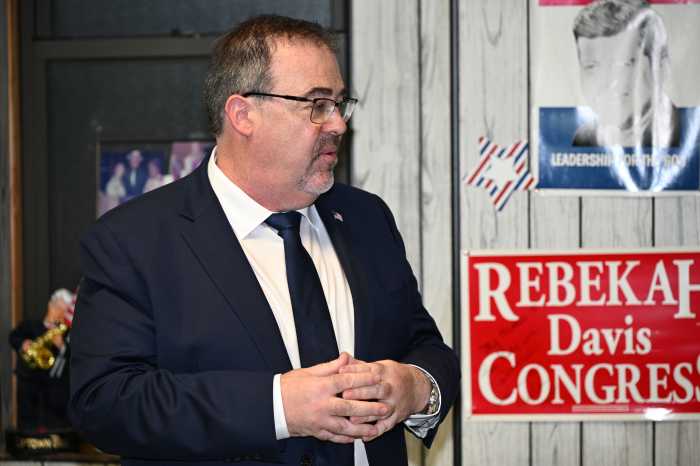
Wong stressed that the recent shooting victim, Kevin Fernandez, is more than just a statistic, and ties the tragedy to a lack of school safety staff due to past budget cuts.
“The 19-year-old who was shot has a name — Kevin Fernandez. I was in front of that house yesterday,” Wong said, citing his involvement with the local school board.
“We take it for granted that there would be school safety agents there or crossing guards, but those people are simply not there anymore because they were defunded a couple of years ago.”
He argued that restoring full funding for school safety agents and crossing guards is essential for preventing violence and ensuring both school and neighborhood safety, highlighting his and Council Member Holden’s firm stance on public safety. Wong added that he had protested at City Hall to restore those roles.
Pogozelski outlined a broader vision for improving public safety by addressing systemic challenges in law enforcement and community well-being. He called for increasing police staffing and wages to reduce response times and overtime. He also proposed creating a dedicated mental health task force to handle non-criminal crises and alleviate pressure on the NYPD.
Additionally, he highlighted the importance of rebuilding community trust through initiatives that connect residents with local police and support policies that make it possible for first responders to live in the neighborhoods they serve, linking public safety to broader issues like housing affordability and community cohesion.
The candidates were asked about the city’s Vision Zero initiative and recent crash data that shows 1,266 traffic accidents in the district over two years, including 15 fatalities and over 1,000 injuries.
Wong raised broader concerns about how citywide transportation policies can overlook the unique needs of individual neighborhoods. He critiqued the Department of Transportation’s “one-size-fits-all” approach to bike lane implementation, emphasizing that local voices were excluded from the decision-making process.
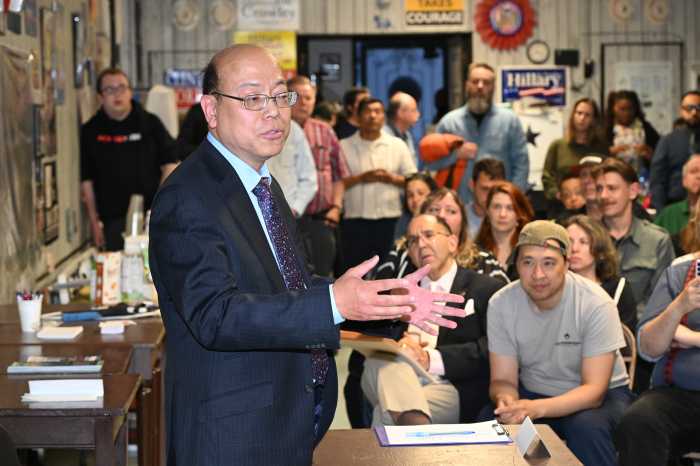
Wong argued for a more community-driven model considering street size, usage patterns, and safety. He also highlighted a growing public safety issue with the misuse of bike lanes by unregulated mopeds, e-bikes, and motorcycles, underscoring the need for better enforcement, accountability, and infrastructure planning that respects both local conditions and evolving transit trends.
Pogozelski emphasized the growing importance of biking as both a practical mode of transportation and a way to keep younger generations engaged in the community. He pointed to increasing citywide congestion and inadequate bike infrastructure as barriers to safe and efficient travel.
Drawing comparisons to European cities where biking is a central part of daily life, he advocated for better-designed bike lanes and safer streets. A tragic incident involving a cyclist who was fatally struck by an FDNY truck underscored his call for change.
Pogozelski argued that without improvements, such as setback zones at intersections to improve visibility, communities would continue to face preventable accidents and rising safety concerns.
Smyth addressed the ongoing citywide debate over bike lanes, noting the division between those strongly in favor and those firmly against them. He acknowledged the growing popularity of biking, especially in areas like Ridgewood, but pointed out a significant issue: bike lanes were increasingly being used by e-bikes instead of traditional pedal bikes.
Smyth emphasized the need for better regulation of e-bikes to ensure that bike lanes could be safely and effectively used by cyclists again. He proposed solutions for protecting bike lanes, citing examples from Manhattan where parking spaces were moved away from the curb on wider streets to create bike lanes with better protection.
While recognizing that some parts of his district were strongly opposed to bike lanes encroaching on their neighborhoods, Smyth called for a thoughtful, inclusive approach that listened to community concerns and worked to find ways to balance the needs of cyclists with those of residents.
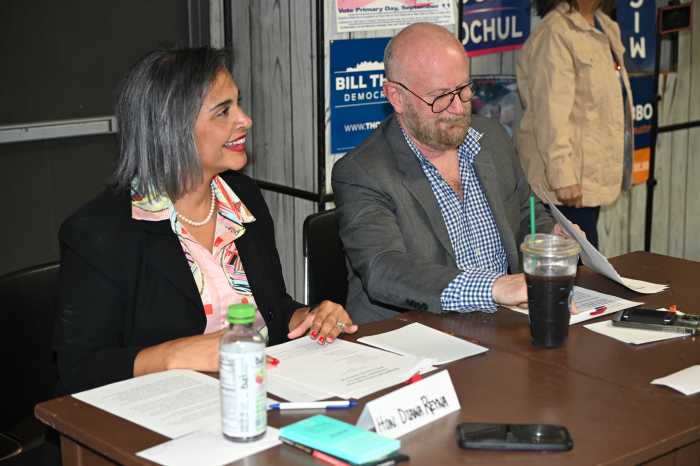
When the topic turned to immigration, the candidates again revealed diverging viewpoints.
Wong, speaking as an immigrant, expressed deep frustration over the city’s decision to spend $6.5 billion over the course of three years to house migrants. He argued that this substantial financial commitment was taking crucial resources away from essential local services, including schools, community centers, parks, and senior centers.
Wong believes this spending was misdirected, as it was being used to address what he saw as a federal immigration issue rather than a local one. He felt that “Washington” should step in to handle the situation, and if the federal government refused to do so, the city needed to reconsider its priorities.
He pointed to the numerous lawsuits and legal challenges surrounding sanctuary cities as evidence that the matter was complicated and had no easy solutions. Ultimately, Wong maintained that city resources should not have been spent on a federal problem and that it was crucial to let the courts determine the legality of sanctuary cities.
Pogozelski, reflecting on his wife’s immigration experience, emphasized the importance of supporting immigrants seeking asylum, many of whom are eager to work and contribute to their communities.
He noted that through his involvement with the MVPOA and the Roller Hockey league, he has worked alongside many people of various immigration statuses, all of whom were making positive contributions to the neighborhood. He pointed out a troubling situation in which individuals were being mass deported to countries like El Salvador, even though they were in the U.S. awaiting due process.
According to Pogozelski, these immigrants were seeking a better life, much like his own grandparents, who had faced racial stereotypes despite being born in the U.S. He strongly opposed the idea of mass deportation without providing services, describing such an approach as “un-American.”
Ultimately, he called for a balanced approach to immigration, one that recognized and supported the valuable contributions immigrants were making in the city.
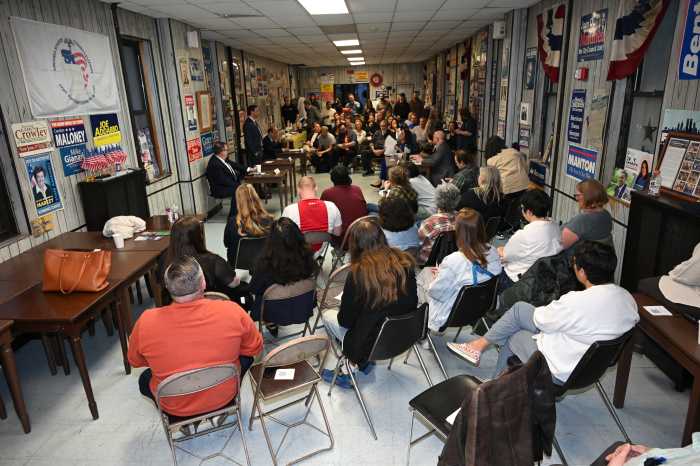
Smyth emphasized the issue’s significance not only in New York City but across the United States. Reflecting on his personal background, Smyth shared that he was born in the U.S. to Irish immigrant parents who returned to Ireland when he was just a few weeks old.
He recounted his experience returning to the U.S. in the 1980s when thousands of Irish immigrants arrived, many of whom worked without proper documentation, often working in the shadows. He acknowledged that this was a common experience for many immigrants, especially those who arrived in the 1990s and early 2000s, who still do not have citizenship.
Smyth highlighted that the process of becoming a U.S. citizen became significantly more difficult after 9/11, as immigration policies were tightened and pathways to citizenship became less accessible.
He compared his father’s experience, noting that when his father immigrated to the U.S. in the 1950s, there was a clearer and more accessible process. His father was able to complete the path to citizenship and eventually secure a city job by joining the military, a decision that was facilitated by a more straightforward immigration process.
Smyth also addressed the current political climate surrounding immigration and emphasized the need to address this issue locally, ensuring that resources were available to house and support immigrants who were already in the country.
He also suggested that, while many people would like to help immigrants seeking a better life, it was unrealistic to expect that everyone who wanted to come to the U.S. could do so without limitations. He argued that if a “magic red button” were available to allow everyone who wished to enter the U.S. instantly, most people would not support such an open-door policy.
As the primary approaches on June 24, each candidate is staking out their vision for the future of District 30 — a community at a crossroads.
Pogozelski frames his campaign around grassroots organizing and revitalization of civic groups. Wong emphasizes public safety, education, and resource management. Smyth leans on organized labor, institutional partnerships, and pragmatic leadership.
The Ridgewood Democratic Club’s debate made one thing clear: while the candidates share a passion for the district, their paths to leadership offer voters distinctly different choices.

